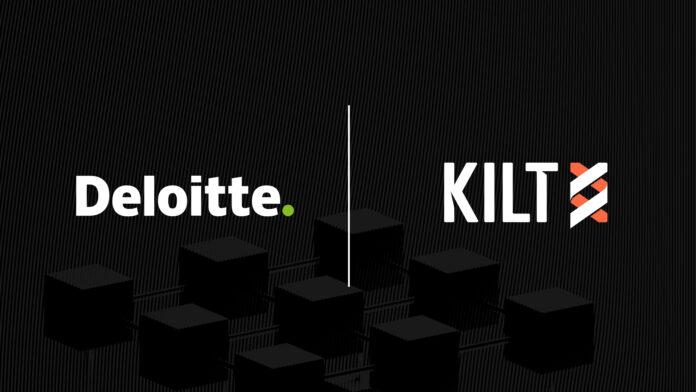Big Four accounting firm Deloitte has announced its integration with KILT Protocol, a Polkadot-based parachain, to enhance its Know Your Customer (KYC) and Know Your Business (KYB) verification processes. The integration aims to streamline identity verification by issuing reusable digital credentials to customers, significantly improving operational factors.
According to a shared with CryptoDaily, Deloitte’s integration of KILT Protocol technology into its verification processes aims to improve efficiency, reduce redundancy, and enhance data privacy. The reusable digital credentials enabled by this integration will have applications across various sectors, including banking, DeFi, e-commerce, and more.
KYC and KYB processes in the past have often involved paper-based certificates and require multiple data points for identity verification, leading to increased workloads and inefficiencies. These methods also pose a risk to consumer data privacy as personal information is stored across multiple platforms and databases. By integrating with the KILT Protocol, Deloitte seeks to address such issues by allowing its customers to store their verification credentials in a single digital wallet.
The digital credentials will then be applicable across various use cases, including regulatory compliance for banking and decentralized finance (DeFi), age verification for e-commerce, private logins, and fundraising. At the time of writing, however, Deloitte has not disclosed specific capacities and technical information for these use cases.
The wallet, in the form of a browser extension, will be stored on the customer’s device and remain under their control at all times. Customers may also choose which data points to share and with whom they share their credentials. Deloitte claims that its customer base would not need any prior knowledge in blockchain-based technologies to make use of the new features.
Notably, Deloitte has disclosed that it will retain the authority to revoke credentials using the parachain if a customer’s circumstances change after the credential was issued. Tthe credentials are also digitally signed by Deloitte, ensuring authenticity and reliability.
1/ @DeloitteCH – the world’s biggest accounting firm – is the latest major enterprise partner to come to the Polkadot ecosystem, choosing cutting-edge tech provided by the @Kiltprotocol parachain to enhance its identity protocols. pic.twitter.com/nkqr0i1s0I
— Polkadot (@Polkadot) May 4, 2023
The claimer may then present the certificate to the services they wish to use, and the verifier of a service can check the validity of the certificate by comparing it to the blockchain’s hash. As attesters are not involved in the verification process, the claimer’s behavior remains unknown, and the claimer can even hide sensitive data that is not necessary for verification. This system ensures that users have full data sovereignty, as they are in control of their certificates.
This announcement comes shortly after reports on April 26 that Deloitte had over 300 crypto-related job opportunities available, with most of them being posted within the same week. In contrast, searches for crypto-related job openings at other Big Four accounting firms—Ernst & Young, KPMG, and PricewaterhouseCoopers—yielded no results.
Credit: Source link





















 Bitcoin
Bitcoin  Ethereum
Ethereum  XRP
XRP  Tether
Tether  Solana
Solana  USDC
USDC  Dogecoin
Dogecoin  Cardano
Cardano  Lido Staked Ether
Lido Staked Ether  TRON
TRON  Wrapped Bitcoin
Wrapped Bitcoin  Wrapped stETH
Wrapped stETH  Chainlink
Chainlink  Avalanche
Avalanche  Sui
Sui  Stellar
Stellar  Litecoin
Litecoin  Toncoin
Toncoin  Shiba Inu
Shiba Inu  Hedera
Hedera  LEO Token
LEO Token  MANTRA
MANTRA  USDS
USDS  Hyperliquid
Hyperliquid  Polkadot
Polkadot  WETH
WETH  Bitcoin Cash
Bitcoin Cash  Bitget Token
Bitget Token  Ethena USDe
Ethena USDe  Wrapped eETH
Wrapped eETH  Uniswap
Uniswap  Monero
Monero  NEAR Protocol
NEAR Protocol  Pepe
Pepe  WhiteBIT Coin
WhiteBIT Coin  Aave
Aave  Bittensor
Bittensor  Ondo
Ondo  Aptos
Aptos  Internet Computer
Internet Computer  Dai
Dai  Official Trump
Official Trump  Ethereum Classic
Ethereum Classic  Mantle
Mantle  Tokenize Xchange
Tokenize Xchange  Gate
Gate  OKB
OKB  sUSDS
sUSDS  Coinbase Wrapped BTC
Coinbase Wrapped BTC 
